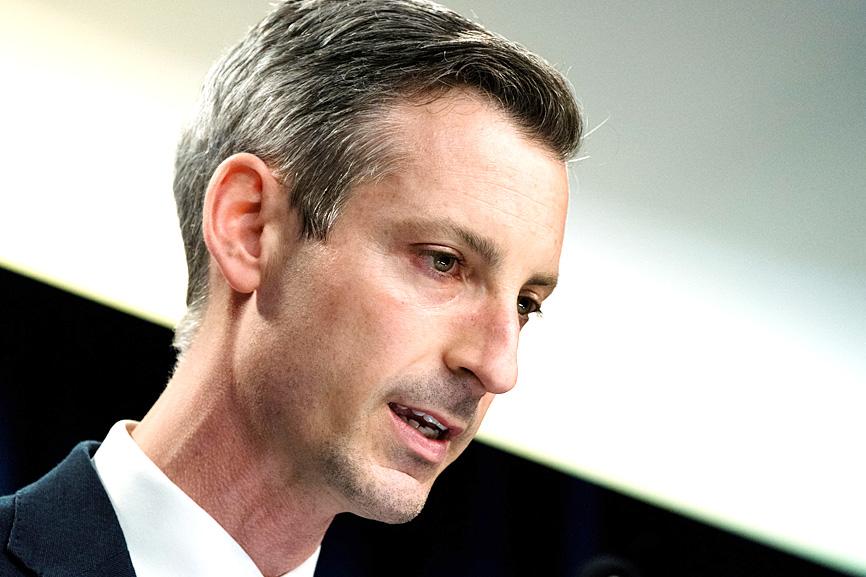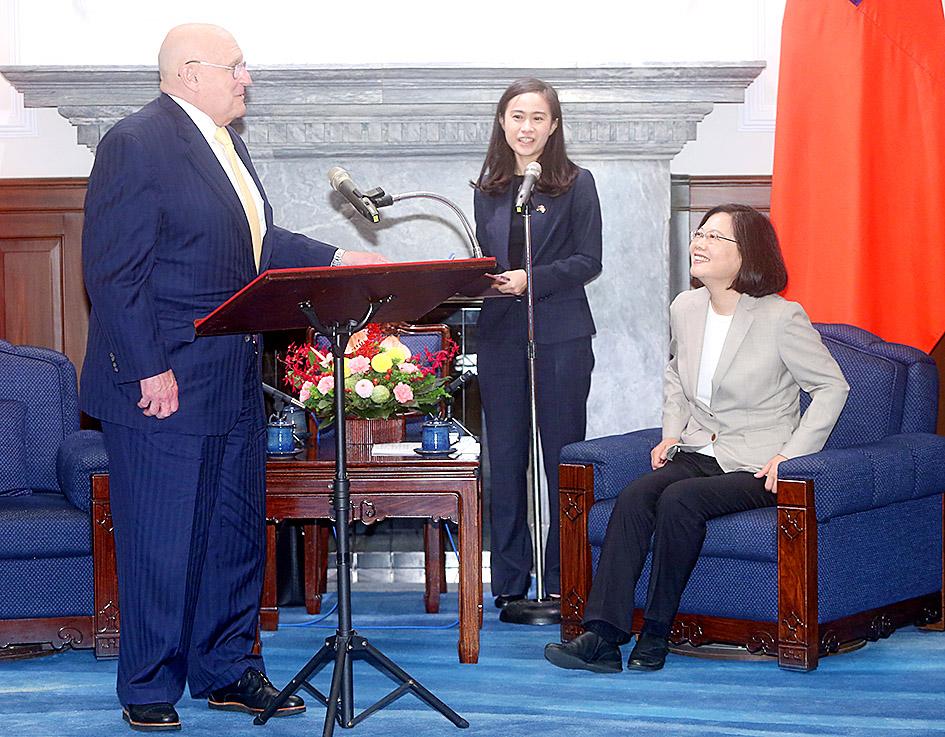Washington on Monday said that US members of Congress would continue to visit Taiwan, while condemning China for restarting live-fire exercises around Taiwan amid a visit to Taipei by US lawmakers, saying it was an “overreaction.”
China conducted drills in the sea and airspace around Taiwan on Monday while a five-member US delegation led by US Senator Ed Markey was in Taipei, near the end of their 21-hour visit.
As of 5pm, China had deployed 30 warplanes and five military vessels in areas around Taiwan, and 15 of the aircraft had crossed the median line of the Taiwan Strait, the Ministry of National Defense said.

Photo: Reuters
Asked about Beijing’s response to Markey’s visit at a news briefing, US Department of State spokesperson Ned Price said that any response to a peaceful visit “that entails bellicose rhetoric or military maneuvers or provocative actions is totally unnecessary and an absolute overreaction.”
Members of the US Congress have visited Taiwan for decades, with about 10 or more congressional delegations having visited Taiwan this year alone, and they would continue to do so, Price said, adding that the practice is in line with the US’ longstanding “one China” policy.
The US has taken measured and responsible steps in response to Beijing’s maneuvers so as not to escalate the situation, Price said.

Photo: CNA
However, “we won’t be deterred from flying, from sailing, from operating in the region in accordance with international law,” he added.
US President Joe Biden on Friday directed the USS Ronald Reagan aircraft carrier, operating in the Philippines, to remain on station longer than planned, and announced that additional steps in support of Taiwan would be forthcoming, Price said.
The Ministry of Foreign Affairs yesterday said that 33 US members of Congress have visited Taiwan since last year, continuing what has been decades of US visits.
This year alone, Taiwan has welcomed 19 US lawmakers — eight senators and 11 representatives — in addition to the three senators and 11 representatives who visited last year, ministry spokeswoman Joanne Ou (歐江安) told a regular news briefing.
Meanwhile in Singapore, US Seventh Fleet Commander Vice Admiral Karl Thomas yesterday called China’s decision to fire missiles over Taiwan a “gorilla in the room” that must be challenged.
“It’s very important that we contest this type of thing,” Thomas told reporters. “If we just allow that to happen, and we don’t contest that, that’ll be the next norm.”
The Seventh Fleet is based in Japan and is a core part of Washington’s navy presence in the Pacific.
Thomas compared the threats against Taiwan to the South China Sea where Beijing spent years constructing military bases and facilities on a series of contested atolls, which it has denied doing.
“If you don’t challenge it ... all of a sudden it can become just like the islands in the South China Sea [that] have now become military outposts,” he said. “They now are full-functioning military outposts that have missiles on them, large runways, hangars, radars, listening posts.”
Speaking to Radio Free Asia on Monday, former US deputy secretary of state Richard Armitage said that Chinese President Xi Jinping (習近平) bears all responsibility for cross-strait crises.
Armitage, who visited Taiwan in April last year with an unofficial delegation sent by Biden, said that Xi has made many mistakes, including miscalculating the US’ support for Taiwan, supporting Russia in its war in Ukraine and its “zero COVID” strategy.
He is now facing economic and diplomatic fallout from these mistakes for which he must bear responsibility, challenging his bid to retain the presidency later this year, Armitage said.
Additional reporting by Lu Yi-hsuan

CHAOS: Iranians took to the streets playing celebratory music after reports of Khamenei’s death on Saturday, while mourners also gathered in Tehran yesterday Iranian Supreme Leader Ayatollah Ali Khamenei was killed in a major attack on Iran launched by Israel and the US, throwing the future of the Islamic republic into doubt and raising the risk of regional instability. Iranian state television and the state-run IRNA news agency announced the 86-year-old’s death early yesterday. US President Donald Trump said it gave Iranians their “greatest chance” to “take back” their country. The announcements came after a joint US and Israeli aerial bombardment that targeted Iranian military and governmental sites. Trump said the “heavy and pinpoint bombing” would continue through the week or as long

TRUST: The KMT said it respected the US’ timing and considerations, and hoped it would continue to honor its commitments to helping Taiwan bolster its defenses and deterrence US President Donald Trump is delaying a multibillion-dollar arms sale to Taiwan to ensure his visit to Beijing is successful, a New York Times report said. The weapons sales package has stalled in the US Department of State, the report said, citing US officials it did not identify. The White House has told agencies not to push forward ahead of Trump’s meeting with Chinese President Xi Jinping (習近平), it said. The two last month held a phone call to discuss trade and geopolitical flashpoints ahead of the summit. Xi raised the Taiwan issue and urged the US to handle arms sales to

State-run CPC Corp, Taiwan (CPC, 台灣中油) yesterday said that it had confirmed on Saturday night with its liquefied natural gas (LNG) and crude oil suppliers that shipments are proceeding as scheduled and that domestic supplies remain unaffected. The CPC yesterday announced the gasoline and diesel prices will rise by NT$0.2 and NT$0.4 per liter, respectively, starting Monday, citing Middle East tensions and blizzards in the eastern United States. CPC also iterated it has been reducing the proportion of crude oil imports from the Middle East and diversifying its supply sources in the past few years in response to geopolitical risks, expanding

Pro-democracy media tycoon Jimmy Lai’s (黎智英) fraud conviction and prison sentence were yesterday overturned by a Hong Kong court, in a surprise legal decision that comes soon after Lai was jailed for 20 years on a separate national security charge. Judges Jeremy Poon (潘兆初), Anthea Pang (彭寶琴) and Derek Pang (彭偉昌) said in the judgement that they allowed the appeal from Lai, and another defendant in the case, to proceed, as a lower court judge had “erred.” “The Court of Appeal gave them leave to appeal against their conviction, allowed their appeals, quashed the convictions and set aside the sentences,” the judges